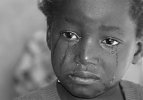Herdsmen arrested for poisoning lions in Kenya's Maasai Mara
Dead lions include 17-year-old Bibi, who appeared on the BBC’s long-running Big Cat Diary series

A Maasai herdsman with his cattle near Makindu, Kenya. Photograph: Radu Sigheti/Reuters
Agencies in Nairobi
Tuesday 8 December 2015 09.53 EST Last modified on Tuesday 8 December 2015 11.12 EST
Two Maasai herdsmen have been arrested for allegedly poisoning lions in the Masaai Mara game reserve after the lions killed two of their cows, according to a Narok county wildlife official.
The lions are members of the Marsh pride, which has featured on the BBC’s long-running Big Cat Diary series. Two of the lions are dead, one is missing and at least five are being treated by vets, a conservation group and a BBC wildlife crew at the scene said.
The Masai Mara: 'It will not be long before it's gone'
Read more
Moses Kuyioni, a local wildlife official, said the men are suspected of poisoning meat which they set up for the lions to eat. He said the lions had attacked the herdsmen’s cattle when they entered the game reserve in western
Kenya on Sunday. Local cattle-herders frequently bring their animals into the Masai Mara reserve to graze.
“I am sick to the heart to hear of the poisoning of the Marsh Pride lions, and horrified to think of the pain they suffered as they died,” said Saba Douglas-Hamilton, a Kenyan conservationist and television presenter who worked on Big Cat Diary.
Among the dead lions was 17-year old female Bibi, who had become something of a celebrity during the TV series’ long and hugely popular run from 1996 to 2008. The BBC crew said she was found “lying on her side, foaming at the mouth, fitting and panting” before she died.
Conservationists first noticed something was wrong on Sunday morning when some of the lions, “were acting strangely collapsing and suffering from spasms”, according to a statement from the David Sheldrick
Wildlife Trust, which funds a mobile veterinary unit in the reserve.
“There is nothing shocking anymore as to what is happening in the Maasai Mara,” he added, blaming years of “appalling management” by local authorities.
Kuyioni said that because of land division and urbanisation the Maasai herdsmen had little option but to explore the game reserve for food as their traditional grazing lands have been subdivided to individuals. Human-wildlife conflict is seen as a big threat to the existence of lions in Kenya.



